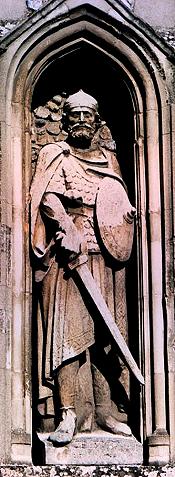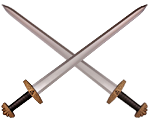Introduction
 It is now over a thousand years since the battle which took place near
the town of Maldon in the year 991. It is generally thought that the battle
took place near the causeway to Northey Island on the shores of the River
Blackwater, referred to in the poem as the 'Panta'. (A new theory about the location of the battle site can be found here).
It is now over a thousand years since the battle which took place near
the town of Maldon in the year 991. It is generally thought that the battle
took place near the causeway to Northey Island on the shores of the River
Blackwater, referred to in the poem as the 'Panta'. (A new theory about the location of the battle site can be found here).
The poem was probably written at the end of the tenth century, and it
is one of the most famous writings in Old English which have survived.
Unfortunately, the manuscript, which was in the collection of Sir Robert
Bruce Cotton, was destroyed in a fire in 1731, but a transcript had been
made - although the beginning and end of the poem have been lost.
In the battle, the Vikings, under their leader Anlaf, try to land at Maldon after a series of raids along the Essex coast. Here they are confronted by a substantial Anglo-Saxon force, led by Earl Byrhtnoth (or Beorhtnoth, but whose name is now commonly modernised as Brithnoth). The Vikings demand payment as the price of their withdrawal, but Brithnoth scorns the idea of Danegeld, and rejects the offer with contempt.
The battle has to wait because of the rising tide. When the tide ebbs, Brithnoth allows the Vikings to cross the river in order to fight on the surrounding land. The Essex men at first stand firm against the invaders, but when Brithnoth is killed by a poisoned spear, some of the defenders panic and flee. The others stand by Brithnoth's body, and fight to the last.
A radio play 'The County Arms', a dramatisation of Wilfrid Berridge's
translation given on this web site, was written and produced by Tony Kendall
(Stormforce Arts) and recorded by BBC Radio Essex. It was transmitted
in August 1991 to coincide with the thousand years' anniversary of the
battle. It was also performed live at the Oakwood Arts Centre in Maldon.

